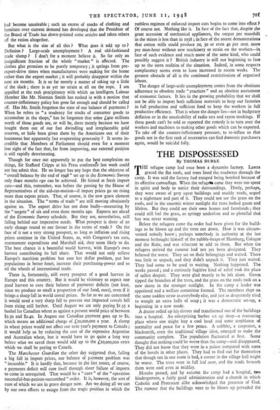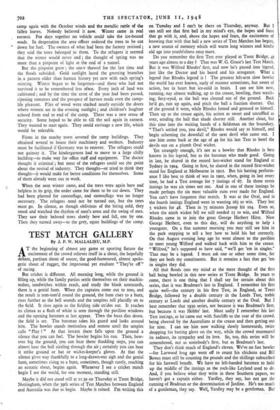THE DISPOSSESSED
By THOMAS BURKE THE refugee camp had once been a dynamite factory. Lawns graced the flat roofs, and trees lined the roadways through the camp. It was said the factory had escaped being bombed because of its effective camouflage. When the refugees came they were too spent in spirit and body to notice their surroundings. Dimly, perhaps, they were aware of grey squat buildings and muddy roads, sequel to a nightmare and part of it. They could not see the grass on the roofs, and in the anaemic winter sunlight the trees looked gaunt and lifeless. But they could see their own homes and farmlands ; they could still feel the grass, so springy underfoot and so plentiful that hay was never wanting.
.Before the refugees came the order had been given for the build- ings to be blown up and the trees cut down. How it was circum- vented nobOdy knew ; perhaps somebody in authority at the last moment bethought himself of the rubble-heaps of Hamburg, Cologne and the Ruhr, and was reluctant to add to them. But when the refugees arrived the rumour had not yet been dissipated. They believed the worst. They sat on their belongings and waited. There was little to unpack, and they didn't unpack it. They just waited. They had come to be used to waiting. Nothing happened. The weeks passed ; and a curiously fugitive kind of relief took the place of sullen despair. They were glad merely to be left alone. Green tipped the branches of the trees, and the grass on the roofs took on a new sheen in the stronger sunlight. In the camp a leader was appointed and a welfare committee formed. The members slept on the same sodden straw as everybody else, and just as desperately triedi to wangle an extra ladle of soup ; it was a democratic set-up, a; beginning in a new mode. A doctor rolled up his sleeves and transformed one of the buildings, into a hospital. An enterprising barber set up shop—a reassuring place where one might buy a cool head and some semblance of, normality and peace for a few pence. A cobbler, a carpenter, a, blacksmith, even the traditional village idiot, emerged to make the community complete. The population fluctuated at first. Some thought that nothing could be worse than the camp—and disappeared. They did not know that they were in a palace compared with some of the hovels in other places. They had to find out for themselves that though ten in one room is bad, a corner in the village hall might be worse. The trees were in full leaf .now, and the roads beneath them were cool even at midday.
Months passed, and by autumn the camp had a hospital, two kindergartens, a fairly good administration and a church in which Catholic and Protestant alike acknowledged the presence of God. The rumour that the buildings were to be blown up pervaded the
camp again with the October winds and the metallic rattle of the fallen leaves. Nobody believed it now. Winter came in real earnest. For days together no vehicle could take the ice-bound roads. In desperation the area officer ordered the trees to be cut down for fuel. The owners of what had been the factory resisted ; they said the trees belonged to them. To the refugees it seemed that the winter would never end ; the thought of spring was no more than a pinpoint of light at the end of a tunnel.
But the pinpoint grew ; the sno.v thawed for the last time and the floods subsided. Gold sunlight laced the greening branches in a pattern older than human history yet new with each spring's minting. Winter began to be forgotten—and those who had not survived it to be remembered less often. Every inch of land was cultivated ; and by the time the crest of the year had been passed, ripening tomatoes and the prospect of harvest made even the camp- life pleasant. Piles of wood were stacked neatly outside the doors where women sat in the evening sunlight ; and children's laughter echoed from end to end of the camp. There was a new sense of security. Some hoped to be able to till the soil again in earnest. They wanted to start again. They could envisage a new life, which would be tolerable.
Firms in the nearby town coveted the camp buildings. They obtained several to house their machinery and workers. Industry must be facilitated if Germany was to recover. The refugees could not gainsay it. The kindergartens had to move to a large chilly building—to make way for office staff and equipment. The doctor thought it criminal ; but most of the refugees could see the point about the revival of industry. They thought—or tried to think they thought—it would make for better conditions for themselves. Some of them already went out to work.
When the next winter came, and the trees were again bare and helpless in its grip, the order came for them to be cut down. They had been planted for camouflage, and camouflage was no longer necessary. The refugees need not be turned out, but the trees must go. In silence, as though oblivious of the biting cold, they stood and watched the rhythm of men's arms and the swing of axes. They saw their beloved trees slowly bow and fall, one by one. Then they turned away—to the grey, squat buildings of the camp.































 Previous page
Previous page